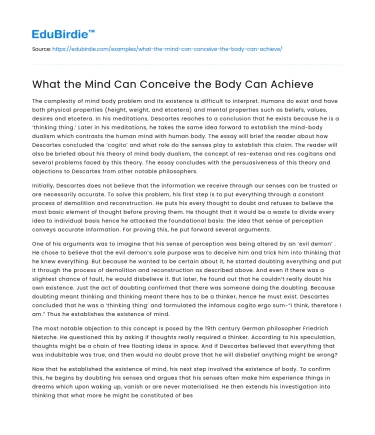The complexity of mind body problem and its existence is difficult to interpret. Humans do exist and have both physical properties (height, weight, and etcetera) and mental properties such as beliefs, values, desires and etcetera. In his meditations, Descartes reaches to a conclusion that he exists because he is a ‘thinking thing.’ Later in his meditations, he takes the same idea forward to establish the mind-body dualism which contrasts the human mind with human body. The essay will brief the reader about how Descartes concluded the ‘cogito’ and what role do the senses play to establish this claim. The reader will also be briefed about his theory of mind body dualism, the concept of res-extensa and res cogitans and several problems faced by this theory. The essay concludes with the persuasiveness of this theory and objections to Descartes from other notable philosophers.
Initially, Descartes does not believe that the information we receive through our senses can be trusted or are necessarily accurate. To solve this problem, his first step is to put everything through a constant process of demolition and reconstruction. He puts his every thought to doubt and refuses to believe the most basic element of thought before proving them. He thought that it would be a waste to divide every idea to individual basis hence he attacked the foundational basis: the idea that sense of perception conveys accurate information. For proving this, he put forward several arguments.
Save your time!
We can take care of your essay
- Proper editing and formatting
- Free revision, title page, and bibliography
- Flexible prices and money-back guarantee
One of his arguments was to imagine that his sense of perception was being altered by an ‘evil demon’ . He chose to believe that the evil demon’s sole purpose was to deceive him and trick him into thinking that he knew everything. But because he wanted to be certain about it, he started doubting everything and put it through the process of demolition and reconstruction as described above. And even if there was a slightest chance of fault, he would disbelieve it. But later, he found out that he couldn’t really doubt his own existence. Just the act of doubting confirmed that there was someone doing the doubting. Because doubting meant thinking and thinking meant there has to be a thinker, hence he must exist. Descartes concluded that he was a ‘thinking thing’ and formulated the infamous cogito ergo sum-“I think, therefore I am.” Thus he establishes the existence of mind.
The most notable objection to this concept is posed by the 19th century German philosopher Friedrich Nietzche. He questioned this by asking if thoughts really required a thinker. According to his speculation, thoughts might be a chain of free floating ideas in space. And if Descartes believed that everything that was indubitable was true, and then would no doubt prove that he will disbelief anything might be wrong?
Now that he established the existence of mind, his next step involved the existence of body. To confirm this, he begins by doubting his senses and argues that his senses often make him experience things in dreams which upon waking up, vanish or are never materialised. He then extends his investigation into thinking that what more he might be constituted of besides mind. What is it on which he is dependent upon for the existence of his mind and if it is any different from himself? He realises that apart of only thinking, he performs various actions through his hands, feet and other parts which has a distinct existence from his mind and soul. Hence he concludes that he has a ‘body'.






 Stuck on your essay?
Stuck on your essay?

